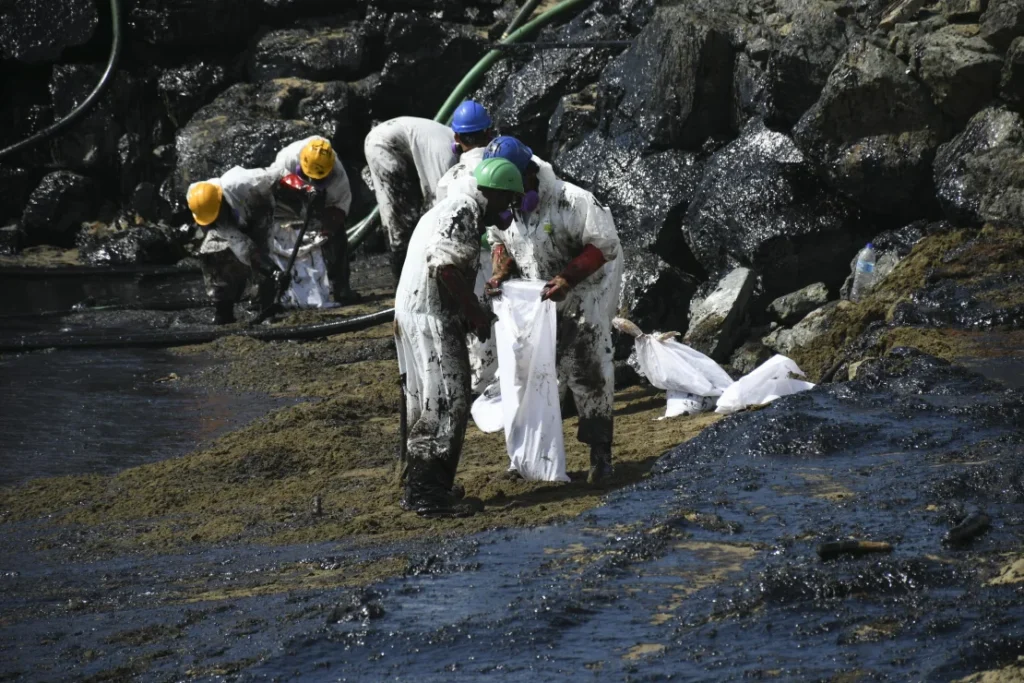Since news first broke in January 2020 about the oil discoveries off Suriname’s coast, the up-and coming oil and gas industry has been the talk of the town.
But while most people are focused on the financial prospects of the oil find, US Program Manager at Oil Change International, Collin Rees, told Cari-Bois that offshore oil-development activities have the potential to cause significant environmental damage.
Using oil spills as an example, Rees emphasised, “While most people may look at oil as a lifeline given Suriname’s financial circumstances, it’s easy for most people to have tunnel vision and forget the environmental aspects connected to the oil-industry.”
Given oil spills can lead to the death of marine organisms and affect marine-based economic activities, Rees’ organisation cites the severe harm and health hazards of oil spills as key reasons to phase out fossil fuels.

Tobago’s oil spill a cautionary tale
On February 7, 2024, a disastrous oil spill occurred off Tobago’s southern coast.
Since then, the spill has contributed to the destruction of some of the island’s marine and coastal ecosystems which have been consequential to tourism.
But the fishing sector was not spared as various media reports – from international outlets like Reuters and local newspapers like the Trinidad Guardian – highlighted that fishermen experienced substantial losses.
The oil spill damaged boats and resulted in Tobago’s authorities prohibiting fishing activities in affected areas.
The spill also drifted further into the Caribbean Sea and threatened the ecological wellbeing of Venezuela and Bonaire’s coasts.

Will oil provide Suriname with economic stability?
In 2023, Patrick Pouyanné, CEO of TotalEnergies (a French multinational integrated energy and petroleum company), revealed that a final investment decision by the company – regarding operating in Suriname – was expected to be finalised at the end of 2024 with the first oil production expected to take place in 2028.
Oil and natural gas data provider, Natural Gas Intelligence, defines the term final investment decision as the last step of a company determining whether to move forward with the sanctioning and construction of an infrastructure project.
Rees told Cari-Bois that the Surinamese population should not forget that fossil fuels are volatile commodities.
He explained, “It might bring in money for a while, but there have been instances where oil prices have crashed and workers have lost their jobs.
“Thus, this industry should not be seen as a means to achieve stable economic peace. Countries should look at different sources to build their economy on’.”

Rees cautioned that some fossil fuel businesses may also make false promises of development.
But he asked people to especially consider the effect of oil and natural gas activities on Surinamese fishermen and coastal communities.
“These people are most impacted by the extraction of crude oil, due to pipelines that explode, drilling activities or oil spills.
“The (2010 Deep Horizon) Gulf of Mexico oil spill and numerous spills in the Caribbean Sea are a testimony of this.”
Offering another perspective on the issue, Rees explained, “On the other hand, these same fossil fuels account for 75 per cent of the global greenhouse gasses which cause climate change that affects the wellbeing of marine ecosystems and coastal communities.”

Suriname’s State Oil Company responds to concerns
In a written statement submitted to Cari-Bois, Suriname’s State Oil Company, Staatsolie, said that oil drilling activities will take place at a far enough distance from the coast.
The company added that oil spill models have shown that in the event of a possible spill in the deep offshore area, the majority of the oil will not – or will hardly – reach the coast of Suriname due to the ocean currents.
But such an event may affect the coast of other countries and the company says that this must be prevented at all costs.
The company’s statement went on to explain that legislation requires companies involved in offshore oil and gas exploration, and production, to conduct extensive social and environmental impact studies.
In doing so, it will be possible to assess potential environmental effects as these assessments help identify risks and develop measures to limit damage to marine ecosystems.

Under regulations, Staatsolie said companies must also have an Oil Spill Emergency Plan.
These plans must outline how to respond to a possible spill, which parties need to be informed, and which parties can assist in the response.
Furthermore, companies must be adequately insured and provide evidence of this to Staatsolie.
Suriname’s National Institute for Environment and Development has the responsibility of coordinating the environmental and social aspects of Oil Emergency Plans while Staatsolie focuses on health and safety aspects.

In this regard, Staatsolie asks companies to provide their HSE (Health, Safety, and Environment) management system, operational plan, risk analyses, mitigation plans, Emergency Preparedness and Response, Performance Monitoring, and reporting.
Production sharing contracts must also include provisions on the environment and what to do in case of pollution and environmental damage.
In case of damage and pollution, the international oil company (the contractor) is responsible for cleaning up and restoring.
The National Coordination Center for Disaster Management (NCCR) coordinates any oil spill mitigation and cleanup efforts.

While Staatsolie seeks to assure the Surinamese public that guardrails are in place for exploration activities, Chairman of the Suriname Seafood Association, Udo Karg, lamented that importance must be placed on preventing oil spills.
Karg told Cari-Bois that Suriname should be able to exploit its oil supplies but it should be done in a responsible way where safety protocols are placed first.
Karg added that Staatsolie has worked closely with the fishery sector from the beginning of the process to discuss the safety aspects related to research activities in the offshore oil field.
“In that regard, Staatsolie has really given us adequate information in order to raise awareness.
“When it comes to the actual production phase however, we all have a collective responsibility, especially the government, the fishery sector and environmental organisation, to ensure our environment is not destroyed.”





